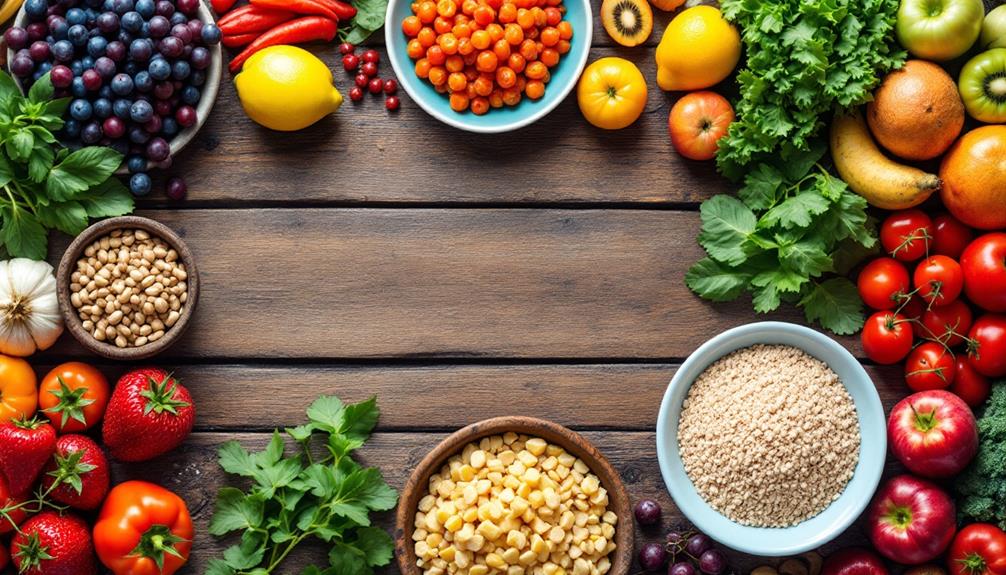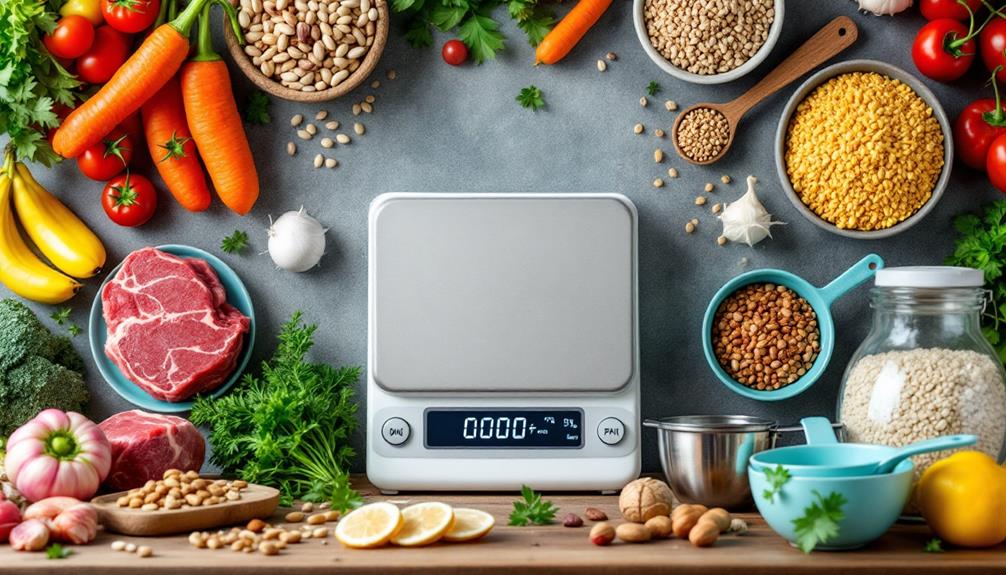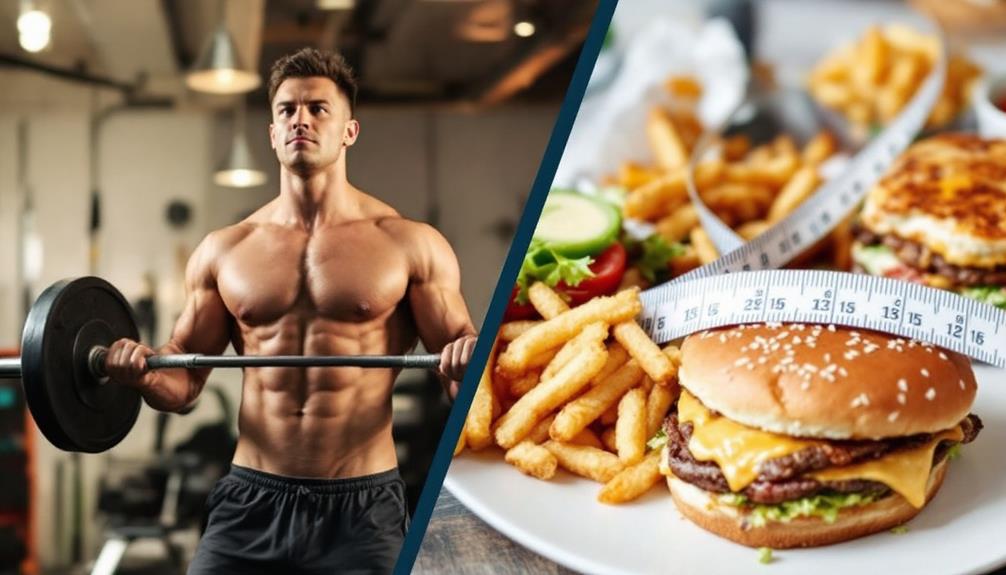To build muscle with a calorie surplus, start by understanding what a surplus means—it's when you consume more calories than you burn. Calculate your daily needs using your basal metabolic rate (BMR) and add 250-500 calories. Next, choose nutrient-dense foods like lean proteins, whole grains, and healthy fats. Aim for a balanced ratio of protein, carbohydrates, and fats to support muscle growth and energy needs. Follow a structured workout plan that includes progressive overload to continually challenge your muscles. Monitor your progress and adjust as needed. Explore more strategies to secure your muscle-building journey is effective and sustainable.
Core Insight
- Calculate your BMR and multiply by your activity factor to establish maintenance calories for muscle growth.
- Aim for a caloric surplus of 250-500 calories daily to support muscle gain.
- Focus on nutrient-dense foods like lean proteins, whole grains, and healthy fats for optimal nutrition.
- Maintain balanced macronutrient ratios, with protein intake between 1.6-2.2 grams per kilogram of body weight.
- Implement progressive overload in your workouts to continuously challenge your muscles for growth.
Understanding Caloric Surplus

To build muscle effectively, you need to understand caloric surplus. A caloric surplus happens when you eat more calories than your body uses. This extra energy helps your muscles grow and recover. When you want to gain muscle, it's important to eat enough to support your workouts and recovery. Clean carb powders can be a great addition to your diet, giving you easy-to-digest energy for tough training sessions.
Focus on nutrient-dense foods that provide not just calories but also important vitamins and minerals. Make whole grains, lean proteins, healthy fats, and lots of fruits and vegetables a regular part of your meals. Remember, it's not just about eating more food; it's about eating the right kinds of food. By keeping a caloric surplus, you create the right conditions for muscle growth and better performance in the gym.
Calculating Your Caloric Needs

For men: BMR = 10 × weight (kg) + 6.25 × height (cm) – 5 × age (years) + 5
For women: BMR = 10 × weight (kg) + 6.25 × height (cm) – 5 × age (years) – 161
To help build muscle, consider adding high-quality whey protein to your diet. Each serving usually has 24-25 grams of protein, which can support your increased calorie needs and help with muscle recovery.
Next, multiply your BMR by an activity factor that matches your lifestyle. This will give you the number of calories needed to maintain your weight. If you want to gain muscle, add 250-500 calories to that total for your calorie surplus.
Choosing Nutrient-Dense Foods

When it comes to building muscle, choosing nutrient-rich foods is key for fueling your body. These foods provide essential vitamins, minerals, and other compounds that help with muscle growth and recovery. Focus on whole foods like lean meats, fish, eggs, legumes, whole grains, fruits, and vegetables. These choices not only give you the calories you need but also deliver important nutrients.
Just like with vegan collagen boosters, it matters where your food comes from. Whenever you can, choose organic and sustainably sourced options. This way, you get the best nutritional benefits from your meals.
Don't forget to add healthy fats to your diet. Foods like avocados, nuts, and olive oil can improve your overall intake. Remember, it's not just about eating more; it's about eating well. By choosing nutrient-dense options, you'll better support your workouts and recovery, making it easier to reach your muscle-building goals. Make these foods a regular part of your diet for the best results.
Macronutrient Ratios for Muscle Gain

Finding the right macronutrient ratios is important for building muscle. To gain muscle effectively, you should focus on a balance of protein, carbohydrates, and fats. A good starting point is 30% protein, 50% carbohydrates, and 20% fats. If you follow a plant-based diet, using vegan pre-workout supplements can help ensure you get the nutrients you need before workouts.
Protein is crucial for repairing and growing muscles. Aim to consume about 1.6 to 2.2 grams of protein for each kilogram of your body weight. Carbohydrates give you the energy needed for tough workouts, while healthy fats support hormone production and overall health.
Feel free to adjust these ratios based on your progress and what works best for you. Keep an eye on how your body responds and change your intake as needed. Remember, being consistent is key, and a balanced diet will help you reach your muscle-building goals.
Designing an Effective Workout Plan

Creating a good workout plan depends on your goals, how much time you have, and your fitness level. Start by figuring out what you want to achieve—like building muscle, improving endurance, or getting stronger. Then, decide how many days you can realistically work out each week.
With that in mind, create a balanced routine. Include compound exercises, like squats and bench presses, as well as isolation exercises, such as bicep curls. Make sure to work both your upper and lower body, so you target all major muscle groups. To boost your results, you might want to think about adding post-workout vitamins to help with muscle recovery and growth.
Remember to include rest days to allow your body to recover. Lastly, stay flexible. If something isn't working for you, feel free to change it. The aim is to build a workout plan that you can stick to and that keeps you motivated as you make progress.
Importance of Progressive Overload

To build muscle effectively, it's important to use progressive overload in your workout routine. This means gradually making your workouts harder so your muscles can grow stronger. You can do this by adding more weight, increasing the number of repetitions, or changing the speed of your exercises. Just like how cooling towels work through specific materials, your muscles respond to increased stress by adapting and growing. This process is key for ongoing improvement and muscle growth.
Monitoring Your Progress
- Track Your Weight: Weigh yourself once a week to check if you're gaining weight at a healthy pace. You might want to use a foam roller to help with muscle recovery and improve your overall progress. This can help keep you flexible and reduce soreness as you work out harder.
- Measure Body Composition: Use calipers or a smart scale to see how your muscle and fat levels change.
- Log Your Workouts: Write down your lifts and reps to make sure you are gradually increasing your strength.
- Take Progress Photos: Take pictures every few weeks to see your changes over time.
Recovery and Rest

After a tough workout, recovery and rest are key for building muscle. Taking time to recover helps repair muscle fibers, which leads to growth and strength. Aim for 7-9 hours of quality sleep each night. Also, consider adding active recovery days with light activities like walking or yoga.
Here are some quick recovery strategies:
| Strategy | Description | Benefits |
|---|---|---|
| Sleep | Get 7-9 hours of sleep each night. | Helps muscles repair |
| Nutrition | Eat protein and carbs after working out. | Supports recovery and growth |
| Hydration | Drink plenty of water all day. | Assists in recovery |
Make these strategies part of your routine, and you'll see better results in your muscle-building journey.
Common Mistakes to Avoid

Building muscle while eating more calories can be challenging, and there are some common mistakes that can slow your progress. To help you stay on track, here are some things to avoid:
- Not Eating Enough Protein: If you don't get enough protein, your muscle growth may suffer. Aim for at least 1.6 grams of protein per kilogram of your body weight. You might also consider using quality creatine supplements to help with muscle growth and strength during your calorie surplus phase.
- Skipping Strength Training: Eating more calories without strength training won't help you build muscle. Make sure to include exercises like squats and deadlifts in your routine.
- Eating Too Many Calories: It's easy to overestimate how many calories you need, which can lead to gaining unwanted fat. Keep track of what you eat to find the right amount.
- Not Allowing Enough Recovery: If you don't take time to rest, your muscles won't recover properly. Be sure to get enough sleep and take breaks between workouts.
Frequently Asked Questions
How Quickly Can I Expect to See Muscle Gains With a Calorie Surplus?
Picture your muscles as seeds in fertile soil; with consistent nourishment, you'll start to see growth within weeks. As you fuel your body, you can expect noticeable gains in about four to six weeks.
Is It Possible to Gain Muscle Without Increasing Calories?
Yes, you can gain muscle without increasing calories, but it's challenging. Focus on optimizing your workout intensity and recovery. If you're consistent with training and nutrition, you might still see some muscle growth.
Can I Build Muscle on a Vegetarian or Vegan Diet?
Did you know that athletes on plant-based diets can gain muscle as effectively as those consuming meat? You can absolutely build muscle on a vegetarian or vegan diet with the right protein sources and balanced nutrition.
What Supplements Can Help With Muscle Gain During a Caloric Surplus?
To enhance muscle gain during a caloric surplus, consider supplements like protein powder, creatine, and branched-chain amino acids. They can boost your workouts and recovery, helping you achieve your fitness goals more effectively.
How Does Age Affect Muscle Building and Calorie Surplus Effectiveness?
As time gracefully unfolds, you'll notice age brings subtle shifts in muscle-building efficiency. Your body's response to a calorie surplus may diminish, requiring you to adapt strategies for best gains and maintain your strength.

